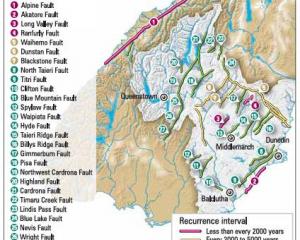
The crime clans have many connections to cement companies, debris-removal outfits and other businesses that could infiltrate the reconstruction process if authorities are not vigilant, warned Franco Roberti, head of the Naples office of investigative magistrates who probe the Camorra crime syndicate based in that southern port city.
"We learned just how involved the Camorra is in this (construction work) by investigating the aftermath of the 1980 quake" near Naples, said Roberti in a telephone interview.
L'Aquila, the largest town in the central Apeninne Abruzzo region, which was rocked by the 6.3-magnitude quake on April 6, is about 240 kilometres north of Naples, and lies outside the southern home turf of Italy's major crime syndicates.
But investigators say Italy's mobsters are increasingly breaking out of traditional geographic boundaries, as they expand into the more affluent central and northern regions in search of ways to launder and invest hundreds of millions of dollars in revenue from drug trafficking, extortion and other rackets.
"Keep the vigilance high against mafias in construction sites," the national Catholic daily L'Avvenire headlined on Sunday, worried that mobsters will enrich themselves from some of the €12 billion (more than $NZ28 billion) in reconstruction money some government estimates say will be needed.
"Cosa Nostra, 'ndrangheta and Camorra have already arrived in Abruzzo and certainly will have their eyes on the reconstruction," Giuseppe Pisanu, a former interior minister who now heads Parliament's anti-mafia commission, has warned.
Pisanu was referring to Italy's three main crime syndicates as he said mobsters have learned to move in political circles throughout Italy as well as enter public administration.
Getting a slice of public works contracts in the underdeveloped south, where the central government has poured billions of dollars over the last decades, has long been a major source of revenue for organized crime, particularly Sicily's Cosa Nostra and the Camorra.
The Casalesi crime clan, a ruthless branch of the Camorra based near Caserta, is considered to be particularly well-positioned to try to get a sizable piece of the reconstruction action.
The Camorra has "the material, the machinery and the men," said Raffaele Cantone, a former Naples anti-Mafia prosecutor now assigned to Italy's top criminal court in Rome.
The clan, long considered by investigators to have economic interests in several parts of northern Italy, has strong ties to companies that remove earth, debris and trash, Roberti said.
One of the Camorra's more profitable rackets is running illegal dumpsites and transporting toxic waste and other trash for companies throughout Italy, prosecutors' investigations have indicated.
One legacy of the many investigations following the Naples quake reconstruction is a law requiring bidders for public contracts to receive certification through police checks that they have no ties with organized crime.
But the certificate is no guarantee mobsters will not get a slice of the contract.
"The problem is the subcontracting, such as for earth removal or getting cement or other supplies," Roberti said.
"Contracting firms can get around this by saying the equipment was rented, or by just not declaring that they subcontracted the work."
Italy's national anti-Mafia prosecutor, Piero Grasso, has announced he will set up a task force of experienced organized crime prosecutors to help L'Aquila authorities run background checks on bidders.
But with tens of thousands of quake refugees sheltered in tent cities, sleeping in seaside hotels which will soon want to rent rooms to summer vacationers or staying at relatives' homes, pressure is growing to get them settled into new or rebuilt homes.
"Urgency plays into the hands of the mafia," Roberti warned.
So far there are no indications that organised crime was to blame for any of the tens of thousands of buildings that collapsed or were heavily damaged. Firefighters clearing rubble in the Abruzzo quake had alleged that poor quality cement and insufficient supporting rods or joints were used in some buildings.
On Monday, prosecutors will begin questioning constructors, engineers and inspectors to see if there is criminal blame.
Headlined across the front-pages of Italian newspapers onSunday was President Giorgio Napolitano's accusation that the Abruzzo devastation was "made worse by greed and contempt for rules" in construction.
Many homes and public buildings were apparently constructed heedless of standards to make them resist quakes of 6.3-magnitude or stronger, despite Abruzzo's long history of powerful temblors.
Almost three decades after the Naples quake, thousands of people were still living in temporary housing, and some of new structures were so poorly built they couldn't be used.
What role Camorra-linked construction might have played in that slow or poorly done reconstruction, despite government funds of some $US32 billion ($NZ56.87 billion), is yet to be fully revealed. Grasso said trials that grew out of post-earthquake probes are still under way.




